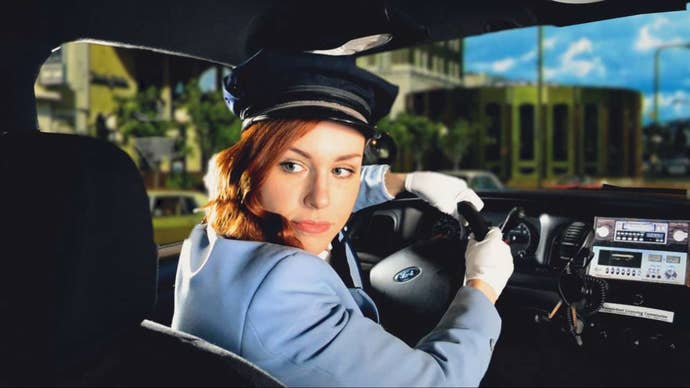Giving a Voice to a Silent Protagonist
How Roundabout gives life to a complex lead character without having her say a word.
This article first appeared on USgamer, a partner publication of VG247. Some content, such as this article, has been migrated to VG247 for posterity after USgamer's closure - but it has not been edited or further vetted by the VG247 team.
Imagine that you've been cast to star in a promising, independent movie.
You show up to the shoot dressed in a chauffeur’s tuxedo--a powder-blue number adorned with so many ruffles it may as well come with a prom-king scepter. You're the living embodiment of '70s style. Countless hours spent practicing in front of a mirror has given you the calm confidence needed to excel. After finishing the first take, you smile inwardly at a job well done, at how well you've brought this fictional character to life, and then the director chimes in with some feedback. “That was really good,” he remarks, “but in your next take try to really mimic that kangaroo.”

Alright, such an exchange (probably) never happened on the set of Roundabout, but it's not as crazy of an idea as you might imagine. This game has a full-motion-video story inspired by an Australian children's series that happens to contain every stereotype an American might have about the land down under. “We had a television show called Skippy the Bush Kangaroo,” says No Goblin creative director Dan Teasdale. “It's kind of like Lassie where this kangaroo is rescuing people and solving mysteries, but all it can do is make a kangaroo tutting sound. It's a lot of conversations like 'What's up, Skip? Is someone trapped in the old barn, Skip?'”
Casting a person as a Skippy (or Lassie) stand-in may sound a little demeaning, but Roundabout goes much further than its delightfully silly premise hints at. Roundabout is an arcade-style action game in which you pilot a continually rotating-limousine around a city. The race for high scores and fast times tests your skill and determination, but it's the story that elevates the entire adventure to a new plain. The star is Georgio Manos (wonderfully realized by Kate Welch), a complex character who never utters a single word. What starts as a lark morphed into something beautiful, sincere, and as funny as the basic concept suggests.
“[Comedy] is where [the idea for a silent protagonist] started from,” Teasdale says. The scenes mostly take place in a car. Georgio sits in the front of her limo, passengers pile in the back, and a one-sided conversation inevitably unfolds. A priest may ask for help finding a wayward groom, his accent echoing an image of a pious pilgrim while he turns phrases that would fit within a deep-south backdrop or possibly Victorian-era England. And all Georgio does is flash her trademark smile or bewildered frown in response to every outlandish statement. The eccentric passengers mesh wonderfully with Welch's staid demeanor, creating goofy exchanges that are as unexpected as they are delightful. It's easy to see the comedic spark that was the impetus for this story.

Georgio is very different from her mute peers across the gaming landscape. “A lot of other silent protagonists are basically camera proxies,” says Teasdale. You can see these cardboard heroes in games such as Chrono Trigger and The Legend of Zelda. Although these are incredible games that expertly draw you into their adventures, Link and Crono are empty cyphers for the player to act out their various whims. Sure, they're heroic, but can you name any other personalty traits? These characters are little more than vessels that allow us to exist within their universes. The same could be said for Half-Life. “Gordon Freeman doesn't really exist for me when I am playing. I'm inhabiting that role,” Teasdale points out.
Georgio started out similar to characters such as these. She was a comedic prop whose one-note reactions served to make people laugh. Passengers would enter and she would turn around to look at them. That was the entirety of who she was. Thankfully, that idea didn't last long. “We wanted to just have that straight-stare reaction, but as we grew the script, we lost the straight stare and put in a lot of her reactions to what's going on,” Teasdale says. And it's that evolution that transformed Georgio into such a fascinating protagonist.A lot of the reason Georgio feels different [from other silent protagonists] is that Georgio has a set of personal motivations,” Teasdale says. Unlike the aforementioned games, you don't control Georgio directly, rather you watch her story play out in FMV cutscenes. You have no input in what kind of person she is. “There's a narrative going on for Georgio that isn't player-driven,” Teasdale explained, “whereas a lot of reason silent protagonists exists in other games is there's a lot of player choice.” By taking that choice out of your hands, No Goblin was able to flesh out Roundabout's protagonist in surprising ways.

For instance, a romance develops in Roundabout that would have been difficult to achieve had Georgio been given a voice. “You think of a romantic comedy in general, there's a lot of conversions like 'Does this girl like me?' There's a lot of internal monologue being projected out to friends.” Teasdale says. Those kinds of conversations take time, much longer than No Goblin wanted to spend in Roundabout. Each scene lasts no more than ten, maybe fifteen seconds, so having Georgio smile or look confused conveys her inner thoughts without dwelling on her every thought. It's an economic approach to storytelling that keeps everything moving at a blistering pace without skimping on the most important details.
And none of this would be possible without full-motion video. The much-maligned storytelling method is used to great effect in Roundabout because its narrative hinges on capturing subtle facial movement. “If we didn't have FMV, it would have been a hundred times the cost, and even then, we probably wouldn't have hit it,” Teasdale says. After years of the game industry turning up its nose at placing real actors on screen, Roundabout shows that such a method still has a place in this medium. Sure, the most expensive games can afford the intricate animations needed to express emotions without words, but for those games that have high ambitious without the budget to match, FMV is an interesting route to take. Georgio wouldn't have existed any other way.
Roundabout sets up Georgio's somewhat selfish goal when the game kicks off. “Georgio wants to be the best revolving-limousine driver at all costs,” Teasdale says. So at the beginning of the adventure, you see her determination while taking her driving test (that doubles as a quick tutorial), and her eagerness to make a (non-verbal) statement that she's a chauffeur to be reckoned with. The script was written without a specific gender in mind for Georgio. It was after much thought that the team decided Kate Welch would be the perfect fit. “I don't think the story would be as good if Kate wasn't Georgio,” Teasdale said. And that's obvious once you seen the cutscenes play out. With no more than a wrinkle of her brow and an upturned lip, she can say exactly what needs to be said.
It's Georgio's changing motivations that cement this character as something worth taking note of. She deals with love and loss, glory and failure, sneaking in bits of humor in every scene to keep things light while still dealing with the dangerous trappings that would assuredly haunt a world-class limo driver. During one stretch, Roundabout takes cues from Behind the Music—albeit with a knowing smile--as we witness Georgio's downward spiral. Even the best limo drivers get sidetracked by their own success, or, in the case of Georgio, the disembodied voice of a rival French-Canadian driver. Still, Georgio comes away with one important lesson: “There's more to life than revolving limousines,” Teasdale says.
Now ask yourself: Could a mere kangaroo have delivered such sage advice?
